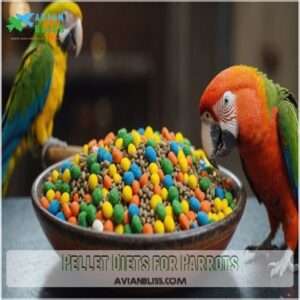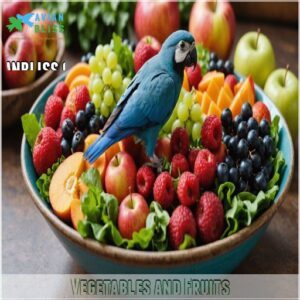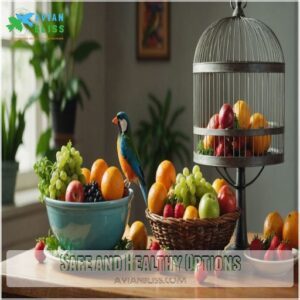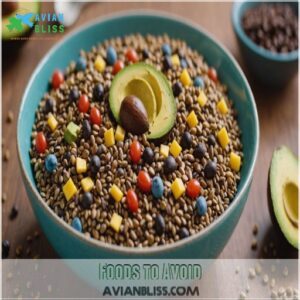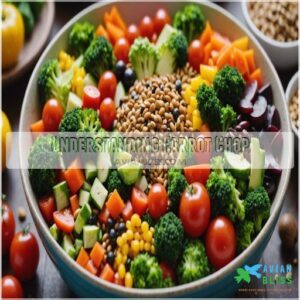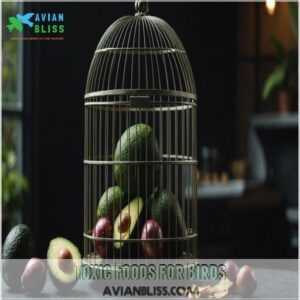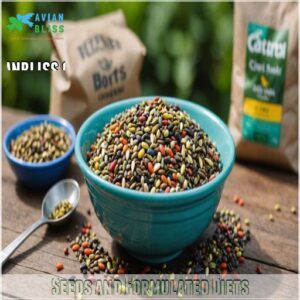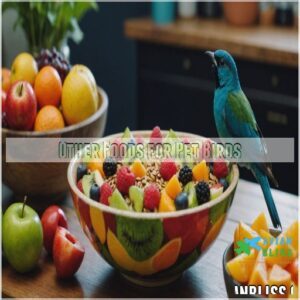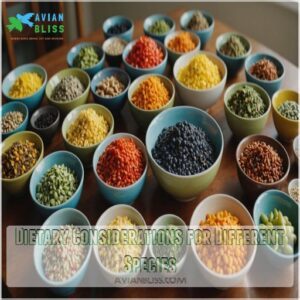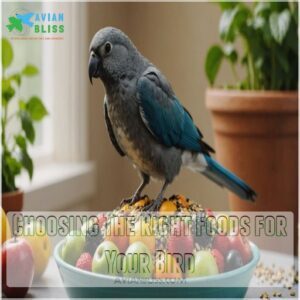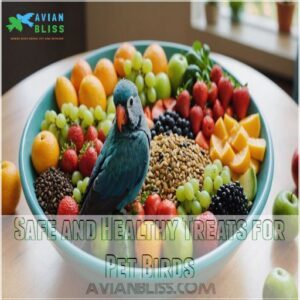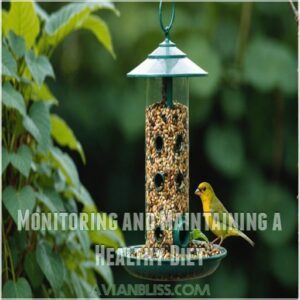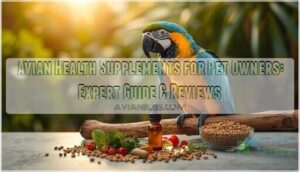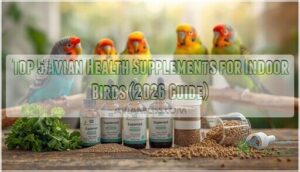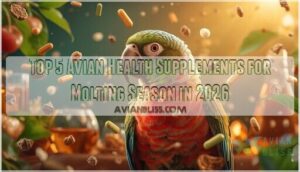This site is supported by our readers. We may earn a commission, at no cost to you, if you purchase through links.

You’ll want to make pellets the cornerstone, comprising 50-70% of your feathered friend’s daily intake.
These nutritional powerhouses guarantee your bird gets essential nutrients without becoming a picky eater.
Supplement with fresh fruits and veggies for vitamins and minerals, but watch out for toxic foods like avocado and chocolate.
Parrot chop, a mix of cooked grains and chopped veggies, can add excitement to mealtime.
Remember, seeds are more like bird candy – tasty but troublesome in large amounts.
By focusing on a well-rounded diet, you’re not just feeding your bird; you’re promoting its overall health and happiness.
Table Of Contents
- Key Takeaways
- Pellet Diets for Parrots
- Fresh Foods for Pet Birds
- Understanding Parrot Chop
- Toxic Foods for Birds
- Seeds and Formulated Diets
- Other Foods for Pet Birds
- Dietary Considerations for Different Species
- Choosing The Right Foods for Your Bird
- Safe and Healthy Treats for Pet Birds
- Monitoring and Maintaining a Healthy Diet
- Frequently Asked Questions (FAQs)
- Do parrots need a balanced diet?
- What is the best dog food for a bird?
- What can a pet bird eat?
- What should a pet parrot eat?
- What is the healthiest food for birds?
- What should an owner feed their pet bird?
- What should you not feed birds?
- What is the best thing to feed birds?
- How often should I change my birds water?
- Can pet birds eat human food leftovers?
- Are vitamin supplements necessary for pet birds?
- How do I introduce new foods to my bird?
- Should I feed my bird warm or cold food?
- Conclusion
Key Takeaways
- Make pellets 50-70% of your bird’s diet, as they provide essential nutrients and prevent picky eating habits.
- Supplement with fresh fruits and vegetables for vitamins and minerals, but avoid toxic foods like avocado and chocolate.
- Limit seeds to occasional treats, as they’re high in fat and can lead to nutritional imbalances.
- Monitor your bird’s food intake, droppings, and overall health, adjusting their diet as needed with guidance from an avian vet.
Pellet Diets for Parrots
When you’re planning a healthy diet for your parrot, pellets should make up 50-70% of their daily intake.
These specially formulated diets, like those from Lafeber, Harrison’s, and Roudybush, provide essential nutrients that prevent picky eating habits.
Benefits of Pellets
Pellet diets are a lifesaver for your feathered friend.
They guarantee nutritional balance and support digestive health by offering a well-rounded mix of essential nutrients.
These formulated diets reduce waste since your parrot isn’t picky, increasing variety in their meals.
Including USDA certified organic bird food in their diet can provide a complete nutritional package free from artificial additives and fillers.
Conveniently, they make diet planning easy, helping you sustain a healthy parrot diet without much fuss.
Recommended Pellet Brands
Finding the right pellets for your parrots can feel like a treasure hunt.
Brands like Harrison’s, Zupreem Naturals, and Roudybush are top picks for quality and balanced nutrition.
They avoid additives, ensuring a healthy base for your parrot diet.
Always compare pellet ingredients and costs, and consult your avian vet for personalized advice on the best pelleted diets.
Converting to Pellets
After choosing from great brands like those found on the internet at "bird food pellets online" bird food pellets online, it’s time to switch your feathered friend to pellets.
Start with a gradual change, mixing pellets with their current seed diet to let your bird adjust.
Birds have preferences, so expect resistance.
Consult your vet for guidance on bird diet changes, focusing on their species.
With patience, you’ll get your bird on a balanced diet.
Fresh Foods for Pet Birds
Now that we’ve covered pellets, let’s explore the delicious world of fresh foods for your feathered friend.
Adding fresh fruits and vegetables to their diet provides essential vitamins and minerals, making their meals more exciting and nutritious.
Vegetables and Fruits
Elevate your bird’s diet with a colorful mix of vegetables and fruits, adding zest and nutrition.
Fresh foods offer essential nutritional value and variety, boosting your parrot’s health.
Consider seasonal choices for ■fruit variety■ and avoid pitfalls by steering clear of toxic fruits.
Prepare veggies thoughtfully, ensuring they’re clean and safe to munch.
Explore these options for a happier, healthier feathered friend:
- Fresh fruits
- Seasonal veggies
- Nutritious greens
Safe and Healthy Options
You’ve covered vegetables and fruits, now let’s explore safe and healthy options.
A bird-safe kitchen helps your parrot get the nutrients it needs.
Consider a complete list of foods parakeets can eat and what they shouldn’t parakeet food list.
Try fresh vegetables like kale or sweet potatoes, and remember food prep tips: chop veggies to size.
Homemade treats using soaked legumes or raw, unsalted nuts add variety.
Safe foraging stimulates bird health, sprucing up their seed mix.
Foods to Avoid
Regarding feeding your feathered friend, avoid certain dangers lurking in your kitchen.
Avocado, chocolate, onions, and alcohol are toxic foods that spell trouble for birds.
Even seemingly harmless apple seeds and caffeine can cause bird stress.
Stick to safe alternatives, ensuring treats for pets align with smart dietary guidelines.
Always prioritize bird safety for happy, healthy lives.
Understanding Parrot Chop
When you prepare parrot chop, you create a vibrant mix of cooked grains, legumes, and finely chopped vegetables that keeps your feathered friend healthy and happy.
This simple yet effective meal plan provides essential nutrients, ensuring a balanced diet for your parrot.
Ingredients and Preparation
Understanding parrot chop involves merging diverse ingredients for a healthy meal, keeping in mind the importance of a balanced diet for pet birds.
Imagine this: a colorful mix of grains, legumes, and vegetables ensures balanced nutrition.
Always prioritize ingredient sourcing and food safety to protect your feathered friend.
Here’s a quick prep rundown:
- Cook grains and legumes.
- Chop vegetables finely.
- Mix ingredients.
- Freeze portions for storage.
Benefits of Parrot Chop
With parrot chop, you’re not just feeding—you’re creating a bond with your bird.
This nutritious and convenient meal combines variety, aiding digestion while catering to picky eaters.
The mix reflects their natural diet, promoting well-being.
In emergencies or stressful times, this homemade meal helps your bird’s comfort and socializing moments, enhancing bird bonding naturally.
Tips for Feeding Parrot Chop
Because parrot chop is a nutritious addition to your bird’s diet, offer it alongside pellets and fresh foods.
Start with small amounts to gauge your bird’s preference.
You can find a variety of parrot food options at parrot food supplies.
Adjust the Chop Frequency based on your bird’s response.
Experiment with Chop Variations to keep things interesting!
Proper Chop Storage is key; freeze leftovers in individual portions.
Remember, a varied diet is best, especially for multiple birds.
Enjoy watching your feathered friend enjoy their healthy meal!
Toxic Foods for Birds
Knowing which foods are essential for your bird’s health and safety is very important.
Common foods like chocolate, caffeine, and avocado can harm your feathered friend, so it’s important to avoid these and keep your bird safe.
Common Toxic Foods
After crafting the perfect parrot chop, it’s time to watch out for toxic foods lurking in your kitchen. Avocado dangers, chocolate risks, onion toxicity, caffeine effects, and dairy hazards can harm your feathered friend.
Keep your bird safe by avoiding:
- Avocado: Toxic nature
- Chocolate: Harmful ingredients
- Onions: Dangerous effects
- Dairy: Digestive issues
Stay informed to protect your pet.
Symptoms of Toxicity
Spotting signs of toxicity in your bird can be tricky.
Imagine your pet showing lethargy, vomiting, or diarrhea.
A sudden loss of appetite, feather plucking, or unusual droppings might make you nervous.
These symptoms can be serious.
After spotting these signs, don’t hesitate to seek help.
Your bird’s swift recovery depends on your quick action and care.
Prevention and Treatment
Recognizing toxic food symptoms in birds, such as sudden illness or unusual behavior, is just the start.
Prevention is key.
Keep harmful foods like avocado and chocolate out of reach.
If you suspect your bird has eaten something bad, contact an avian vet immediately.
Regular check-ups help prevent potential bird health issues and safeguard against nutritional deficiencies and parasites.
Seeds and Formulated Diets
You’ll find that feeding your bird a balanced diet isn’t just about tossing a handful of seeds in their bowl, as mimicking their natural diet, including seasonal variations in food sources such as what wild birds eat, can be challenging, as formulated diets offer complete nutrition that wild birds naturally get from diverse food sources.
While seeds can be tasty treats, you’ll want to make formulated pellets the main part of your bird’s diet to guarantee they get all the vitamins and minerals they need to thrive.
Risks of Seed-Based Diets
The colorful bowl of seeds that looks like a feast can actually be a ticking time bomb for your feathered friend.
While seeds might seem like natural bird food, they’re more like bird candy – tasty but troublesome.
Your bird could face serious health challenges if seeds dominate their diet:
- Weight gain and obesity from high-fat content
- Liver disease due to excessive fats
- Heart problems from poor nutrition
- Vitamin A deficiencies affecting immunity
- Weak bones from lack of calcium
Benefits of Formulated Diets
Modern formulated diets pack a powerful punch for your feathered friend’s health.
You’ll love how these carefully crafted pellets deliver perfect nutrient balance in every bite, unlike those tricky seed-only diets.
They’re super convenient too – no more watching your bird cherry-pick their favorites and waste the rest.
Plus, you’ll see fewer health issues since your bird gets all the vitamins and minerals they need.
Choosing The Right Diet
Setting up your bird’s diet can feel like solving a puzzle, but we’re here to help! Now that you understand formulated diets, let’s pick the perfect mix for your feathered friend. Your bird’s age, species, and health needs will shape their ideal diet plan.
- Choose pellets that match your bird’s size and species
- Mix in fresh vegetables for variety and nutrients
- Consider any food allergies or sensitivities
- Watch your bird’s weight and adjust portions
- Start with small changes to prevent food rejection
Other Foods for Pet Birds
You’ll discover that cooked grains, legumes, and sprouted seeds can add variety and essential nutrients to your pet bird’s diet.
While these foods shouldn’t replace pellets as the main course, they’ll give your feathered friend the extra nutrition boost it needs to stay healthy and happy.
Cooked Grains and Legumes
Beyond basic pellets and seeds, your feathered friend will love nutritious cooked grains and legumes.
You’ll want to steam or boil quinoa, brown rice, and millet until they’re tender but not mushy.
Add some protein-packed lentils or split peas to create a warm, comforting feast.
Just remember to let everything cool completely before serving – nobody likes a burnt beak!
Sprouted Seeds
Including nutrient-rich foods like quinoa, which provides essential proteins, vitamins, and minerals for birds, especially quinoa for birds. Sprouted seeds pack a powerful nutritional punch that’ll take your bird’s diet to new heights. Just like your morning coffee gives you energy, sprouted seeds release hidden nutrients through the germination process. You’ll find these living foods bring out your feathered friend’s natural foraging instincts, making mealtime both fun and healthy.
- Start with organic seeds like sunflower, millet, or quinoa to guarantee the safest sprouting journey
- Rinse sprouts twice daily and watch for any unusual smells that could signal harmful bacteria
- Store completed sprouts in the refrigerator and serve small portions to keep them fresh
Vitamin and Mineral Supplements
When you’re feeding your bird a balanced diet of pellets and fresh foods, vitamin supplements usually aren’t necessary.
You’ll want to consult your vet before adding any supplements, as overdose risks can outweigh potential benefits.
| Supplement Type | What You Need to Know |
|---|---|
| Calcium | Only needed for breeding birds |
| Vitamin A | Found naturally in carrots, sweet potatoes |
| Vitamin D3 | Sunlight exposure is better than supplements |
| Multi-vitamin | Rarely needed with proper pelleted diet |
Dietary Considerations for Different Species
Different bird species have unique dietary needs that you’ll need to think about when planning their meals.
You’ll find that parrots, finches, canaries, and other pet birds each require a specific approach to nutrition, ensuring they get the right balance of nutrients for good health.
Parrots
Parrots need a balanced diet to thrive.
You’ll want to feed your feathered friend a mix of pellets (50-70%) and fresh foods.
Choose pellets without added sugar or dyes.
Offer a variety of vegetables and fruits, but limit seeds and nuts to 10-20% of their diet.
Remember, good nutrition impacts parrot behavior, training success, and lifespan.
Keep an eye out for signs of parrot diseases, which can be linked to poor diet.
Finches and Canaries
Unlike their larger cousins, finches and canaries thrive on a seed-based diet.
You’ll want to offer a high-quality seed mix designed specifically for these little songbirds.
Mix in some fresh greens and fruits for variety.
During breeding season, boost their protein intake with egg food.
Keep their cage clean and spacious, and watch for signs of common ailments like respiratory issues or overgrown beaks.
Other Species
Feeding your feathered friend isn’t a one-size-fits-all affair.
Each species has unique dietary needs.
Let’s look at some popular pet birds:
- Budgies thrive on a mix of high-quality seed, pellets, and fresh veggies.
- Cockatiels need a varied diet with pellets, seeds, and calcium-rich foods.
- Doves prefer a blend of seeds, grains, and occasional fruits.
Remember, you’re the chef in your bird’s restaurant.
Tailor their menu to keep them healthy and chirping happily!
Choosing The Right Foods for Your Bird
Selecting the right foods for your bird is very important for its health and happiness.
You’ll need to think about your bird’s species, consult with an avian vet, and create a balanced diet that includes pellets, fresh foods, and limited treats.
Factors to Consider
When choosing the right foods for your feathered friend, you’ll want to keep several factors in mind.
Your bird’s size, species, and age play a big role in their nutritional needs.
It’s vital to offer a variety in their diet for maintaining gut health and mental stimulation, as seen in the importance of balanced bird diets.
Think about their activity level and overall health too.
Don’t forget to factor in your budget and the time you can dedicate to food prep.
By tailoring their diet to these specifics, you’ll be setting your birdie up for a long, healthy life.
Consulting With an Avian Vet
You’ve got the factors down, but let’s bring in the pros.
An avian vet‘s your bird’s best friend when it comes to getting their diet just right.
Consider consulting with them about the best bird pellets options, such as those found at high-quality online stores supplementing your bird’s diet.
They’ll tailor advice to your feathered pal’s unique needs, considering age, species, and health status.
Don’t wing it alone – schedule those annual checkups.
Your vet can spot potential health concerns early and fine-tune your bird’s menu for the best possible well-being.
Creating a Balanced Diet
A well-balanced diet is the cornerstone of your bird’s health.
Start with high-quality pellets as the foundation, making up 50-70% of their daily intake.
Supplement with a variety of fresh vegetables and fruits to meet their dietary needs.
Introduce new foods gradually, respecting your bird’s feeding habits.
Consider nutritional supplements if recommended by your vet, and offer treats sparingly.
Remember, food conversions take time and patience.
Safe and Healthy Treats for Pet Birds
You can supplement your pet bird’s diet with safe and healthy treats, but be sure to avoid toxic foods like chocolate, which contains caffeine and theobromine, by learning more at what kills birds instantly. that provide variety and enrichment.
When it comes to providing a healthy diet for your pet bird, understanding what baby birds eat in the wild is crucial, as they primarily consume protein-rich insects for growth. Offer fresh fruits, vegetables, nuts, and seeds in moderation to maintain a balanced diet while avoiding toxic foods that could harm your feathered friend.
Fresh Fruits and Vegetables
Fresh fruits and veggies are like nature’s candy for your feathered friend.
Variety matters, so mix it up with seasonal fruits and colorful veggies.
Slice ’em up small for easy pecking.
Remember, nutritional value is key – go for deeply hued options packed with vitamins.
Veggie prep‘s a breeze: wash, chop, and serve.
Stick to safe choices like berries, carrots, and leafy greens.
Your bird will be chirping with joy!
Nuts and Seeds
Nuts and seeds can spice up your bird’s diet, but moderation is key.
Offer a variety of unsalted, raw nuts like almonds, walnuts, and pecans.
Be cautious with seed mixes, as they’re often lacking in nutrients.
For a healthier option, try germinating seeds to boost their nutritional value.
Always remove shells to make sure shell safety, and watch for signs of nut allergies.
Remember, treats should make up no more than 10% of your bird’s diet.
Cooked Treats and Snacks
While raw treats are great, cooked snacks can be a fun addition to your bird’s diet.
Try baking small birdie muffins with whole grain flour, mashed banana, and grated carrot.
These homemade treats offer nutritional value and variety.
Remember, moderation is key – limit treats to 10% of their diet.
Experiment with safe baking techniques, using bird-friendly ingredients to create healthy alternatives your feathered friend will love.
Monitoring and Maintaining a Healthy Diet
You’ll need to keep a close eye on your bird’s diet to make sure it stays healthy.
Watch for signs of good health, monitor food intake and droppings, and adjust the diet as needed to maintain your feathered friend’s well-being.
Signs of a Healthy Bird
Several telltale signs indicate your feathered friend is thriving.
Keep an eye on your bird’s feather condition: they should be sleek and vibrant.
A healthy bird will have bright, alert eyes and maintain steady energy levels throughout the day.
Watch for a hearty appetite and regular eating habits.
Don’t forget to check their beak health: it should be smooth and well-shaped.
These indicators together paint a picture of your bird’s overall well-being.
Monitoring Food Intake and Droppings
Keep a watchful eye on your feathered friend’s eating habits, including their consumption of dairy products like cheese, which can be a nutritious treat in moderation, as explained in the article on birds eating cheese safely. Keep a watchful eye on your feathered friend’s eating habits and droppings.
You’ll want to track how much they’re munching and how often they’re leaving you "presents."
Notice any changes in dropping consistency or color?
That’s your cue to pay attention.
Food waste in the cage bottom can signal appetite changes.
By staying observant, you’ll catch potential issues early and keep your bird’s health soaring high.
Adjusting The Diet as Needed
Your bird’s diet isn’t set in stone. As you monitor their health, you’ll need to make adjustments. Just like us, birds’ nutritional needs change over time.
For large and intelligent birds like African Grey Parrot diets, which may include Nutri-Berries and beta-carotene-rich vegetables, consider these factors when tweaking their menu: Bird age: Growing chicks need more protein, while seniors may require less fat. Weight changes: Increase or decrease portions accordingly. * Seasonal changes: Molting birds might benefit from extra protein.
Remember, a balanced diet is key to your feathered friend’s happiness and longevity. When in doubt, consult your avian vet for specific advice.
Frequently Asked Questions (FAQs)
Do parrots need a balanced diet?
Parrots need a balanced diet for good health.
You’ll want to offer a mix of pellets, fresh veggies, and limited fruits.
This variety makes sure they get all the necessary nutrients, just like you’d want a well-rounded meal yourself.
What is the best dog food for a bird?
Barking up the wrong tree" won’t help your feathered friend!
Dogs and birds have vastly different nutritional needs.
You’ll want to stick with a diet specifically designed for birds, including pellets, fresh fruits, and veggies.
Skip the dog food altogether.
What can a pet bird eat?
Pet birds thrive on a varied diet.
Feed them pellets as the main course, supplemented with fresh veggies and fruits.
Toss in some nuts and seeds as treats.
Avoid toxic foods like avocado, chocolate, and caffeine.
What should a pet parrot eat?
Like a gourmet chef, craft your parrot’s menu with care.
You’ll want to serve a balanced feast of high-quality pellets (50-70%), fresh veggies (25-50%), and limited fruits and nuts (10-20%).
This diet helps your feathered friend thrive.
What is the healthiest food for birds?
The healthiest food for birds is a balanced diet of high-quality pellets and fresh vegetables.
You’ll want to offer a variety of dark, leafy greens and colorful veggies.
Limit fruits and seeds to occasional treats for the best health.
What should an owner feed their pet bird?
Feed your pet bird a balanced diet of high-quality pellets (50-70%) and fresh fruits and vegetables (30-50%).
Offer dark leafy greens, berries, and cooked grains.
Limit seeds and nuts to occasional treats.
Avoid toxic foods like avocado and chocolate.
What should you not feed birds?
Cat food, though not ideal for birds, might be occasionally used as a treat during breeding season, as seen in cat food for birds. Avoid feeding your birds toxic foods like avocado, chocolate, and caffeine.
Don’t give them alcohol, onions, garlic, or high-salt foods.
Steer clear of dairy products, raw meat, and mushrooms.
These can harm your feathered friend’s health.
What is the best thing to feed birds?
Ever wondered what birds truly crave?
Offer a balanced diet of high-quality pellets, fresh veggies, and limited fruits.
Mix it up with cooked grains and legumes.
Toss in some nuts as treats.
You’ll have happy, healthy feathered friends in no time!
How often should I change my birds water?
Change your bird’s water daily to make sure it’s fresh and prevent bacterial growth.
You’ll want to clean the water dish thoroughly with mild soap and rinse well.
For good health, provide clean water twice a day during hot weather.
Can pet birds eat human food leftovers?
Feeding your pet bird human food leftovers isn’t recommended.
While some foods are safe, many can be harmful.
Stick to a balanced diet of pellets and fresh fruits and veggies.
Treat human foods as occasional snacks, not staples.
Are vitamin supplements necessary for pet birds?
Vitamin supplements aren’t usually necessary for pet birds if they’re on a balanced diet.
You’ll give your feathered friend all they need with a mix of quality pellets and fresh fruits and veggies.
Only use supplements if your vet recommends them.
How do I introduce new foods to my bird?
Will your feathered friend try new foods?
Start by offering small amounts alongside familiar favorites.
Be patient and persistent, trying different textures and presentations.
Mimic eating to spark curiosity.
Gradually increase portions as your bird shows interest.
Should I feed my bird warm or cold food?
Serve your bird’s food at room temperature.
Cold food can be uncomfortable, while warm food might burn their sensitive beaks.
Offer fresh veggies and fruits daily, and let pellets sit out briefly before feeding.
Always provide clean, room-temp water.
Conclusion
Feeding your pet bird isn’t rocket science, but it does require some know-how.
By prioritizing a healthy diet for pet birds, you’re setting the stage for a vibrant, happy companion.
Remember, variety is key: pellets, fresh veggies, and occasional treats keep things interesting.
Stay vigilant about toxic foods, and don’t hesitate to consult your vet for personalized advice.
With the right balance, you’ll have a feathered friend that’s not just surviving, but thriving.
Keep an eye on their droppings and behavior – they’re telling you if you’re on the right track!

